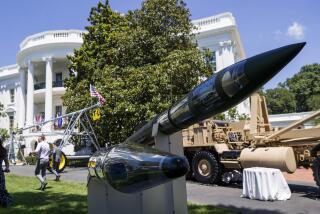U.S. Cautions Israel, Syria to Avoid Provocative Acts
- Share via
WASHINGTON — The United States, increasingly concerned that Syria and Israel are drifting toward war, has urged both countries to avoid provocative actions along their tense border, Secretary of State George P. Shultz said Wednesday.
“We don’t believe a war between Israel and Syria would serve either party’s interests, and we have cautioned against it. . . . But it is a highly tense situation--there’s no doubt about it,” Shultz said.
He said Syria is engaged in a “big (military) buildup” in the Bekaa Valley of eastern Lebanon, an action that Israel considers menacing. The Damascus regime also has increased its tank concentrations on the Syrian side of the demarcation line in the disputed Golan Heights.
Although Shultz did not mention Israeli military action, the Israeli government is known to have made its own preparations both in the Golan and along the Lebanese border.
Further, Shultz said, Israel’s accusation of Syrian involvement in the attempted bombing April 17 of an El Al Israel Airlines jumbo jet in London “has contributed to tension.”
Deputy Secretary of State John C. Whitehead said Tuesday in an interview with United Press International that the United States has “no reason to doubt” Israeli-provided evidence that Syria, as well as Libya, was involved in the El Al incident and the April 5 bombing of a West Berlin nightclub that killed an American soldier, a Turkish woman and injured more than 200.
But Shultz insisted that “it remains to be seen” whether the Damascus regime was involved in the terrorist action. He added, however, that if conclusive evidence of Syrian involvement is obtained, “we will do something about it, (although) it is not the right thing for us to say what we will do tactically.”
Shultz, answering questions after a speech to the Overseas Writers Assn., did not spell out any of the details of the U.S. warnings to Israel and Syria. Assistant Secretary of State Richard W. Murphy recently visited both Jerusalem and Damascus.
Dangerous Situation
U.S. officials consider the Israel-Syria situation to be extremely dangerous because Israel’s ties with the United States and Syria’s links to the Soviet Union mean that any conflict could escalate into superpower confrontation.
Another senior Administration official, who asked not to be identified by name, said the Israel-Syria tensions have been building since last November. He said the United States has been urging both countries to calm these tensions for several months, although such U.S. involvement has not been disclosed previously.
The official said a series of miscalculations on both sides, aggravated by “Soviet disinformation,” contributed to the outbreak of the Arab-Israeli War in 1967. He said Washington hopes to avoid a repeat performance.
U.S. diplomats, he said, have conveyed to both capitals “our reading of the mood” in the other country, in part to counteract the impact of bellicose public speeches by Syrian President Hafez Assad.
Provocative Comments
In a speech considered highly provocative in Jerusalem, Assad recently vowed that Syria would regain the Israeli-annexed Golan Heights, which Israel first occupied in 1967. But the U.S. official described the assertion as “a bit of hyperbole--I don’t think he has any illusion of that happening, at least not on his watch.”
Shultz’s revelation of U.S. efforts to defuse the Israel-Syria tensions, coupled with his assertion that Washington would have to react if it obtained proof of Syrian complicity in terrorist attacks against American targets, underlined a major dilemma facing the Administration. Any U.S. action against Syria, at this time, would torpedo U.S. efforts at peacemaking.
White House spokesman Larry Speakes insisted that “it would be premature to draw any conclusions” about Syrian involvement until investigations by Israel, Britain and West Germany are completed.
Shultz shrugged off reports that Assad is engaged in a new effort to refurbish his reputation by trying to obtain the release of six American and at least eight French hostages in Beirut.
“There is hardly any way to tell whether any party is playing a constructive role on matters of that kind until we have the hostages released,” he said. “We will welcome any efforts. . . . If they ( the Syrians) can be helpful, that would be most welcome.”
Speakes said, “The Syrian government does remain engaged in the efforts to obtain the release of the hostages, and they continue to make an effort in this respect.”
More to Read
Sign up for Essential California
The most important California stories and recommendations in your inbox every morning.
You may occasionally receive promotional content from the Los Angeles Times.













